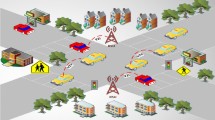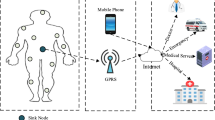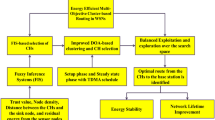Abstract
MANET (mobile ad-hoc network) includes a set of wireless mobile nodes which communicate with one another without any central controls or infrastructures and they can be quickly implemented in the operational environment. One of the most significant issues in MANETs is concerned with finding a secure, safe and short route so that data can be transmitted through it. Although several routing protocols have been introduced for the network, the majority of them just consider the shortest path with the fewest number of hops. Hop criterion is considered for simple implementation and it is reliable in dynamic environments; however, queuing delay and connection delay in the intermediate nodes are not taken into consideration for selecting route in this criterion. In this paper, a fuzzy logic-based reliable routing protocol (FRRP) is proposed for MANETs which selects stable routes using fuzzy logic. It is able to optimize system efficiency. The score allocated to routes are based on four criteria: accessible bandwidth, the amount of energy of battery, the number of hops and the degree of dynamicity of nodes. The simulation results obtained from OPNET simulator version 10.5 indicate that the proposed protocol, in comparison with ad hoc on-demand distance vector (AODV) and fuzzy-based on-demand routing protocol (FBORP), was able to better improve packet delivery rate, average end-to-end delay and throughput.















Similar content being viewed by others
References
Ghaffari, A. (2014). An energy efficient routing protocol for wireless sensor networks using A-star algorithm. Journal of Applied Research and Technology, 12, 815–822.
Ghaffari, A. (2015). Congestion control mechanisms in wireless sensor networks: A survey. Journal of Network and Computer Applications, 52, 101–115.
Alsaqour, R., Abdelhaq, M., Saeed, R., Uddin, M., Alsukour, O., Al-Hubaishi, M., et al. (2015). Dynamic packet beaconing for GPSR mobile ad hoc position-based routing protocol using fuzzy logic. Journal of Network and Computer Applications, 47, 32–46.
Kundu, J., Majumder, K., & De, D. (2016). An efficient trust-based routing scheme by max–min composition of fuzzy logic for MANET. In Proceedings of the International Conference on Recent Cognizance in Wireless Communication and Image Processing (pp. 435–440).
Zhang, X. M., Zhang, Y., Yan, F., & Vasilakos, A. V. (2015). Interference-based topology control algorithm for delay-constrained mobile ad hoc networks. IEEE Transactions on Mobile Computing, 14, 742–754.
Ahmadi, M., Shojafar, M., Khademzadeh, A., Badie, K., & Tavoli, R. (2015). A hybrid algorithm for preserving energy and delay routing in mobile ad-hoc networks. Wireless Personal Communications, 85, 2485–2505.
Misra, S., Krishna, P. V., Bhiwal, A., Chawla, A. S., Wolfinger, B. E., & Lee, C. (2012). A learning automata-based fault-tolerant routing algorithm for mobile ad hoc networks. The Journal of Supercomputing, 62, 4–23.
Chettibi, S., & Chikhi, S. (2016). Dynamic fuzzy logic and reinforcement learning for adaptive energy efficient routing in mobile ad-hoc networks. Applied Soft Computing, 38, 321–328.
Kots, A., & Kumar, M. (2014). The fuzzy based QMPR selection for OLSR routing protocol. Wireless Networks, 20, 1–10.
Yuste, A. J., Triviño, A., & Casilari, E. (2013). Type-2 fuzzy decision support system to optimise MANET integration into infrastructure-based wireless systems. Expert Systems with Applications, 40, 2552–2567.
Omidvar, A., & Mohammadi, K. (2014). Particle swarm optimization in intelligent routing of delay-tolerant network routing. EURASIP Journal on Wireless Communications and Networking, 2014, 1–8.
Suraj, R., Tapaswi, S., Yousef, S., Pattanaik, K., & Cole, M. (2015). Mobility prediction in mobile ad hoc networks using a lightweight genetic algorithm. Wireless Networks, 22, 1–10.
Alghamdi, S. A. (2016). Load balancing maximal minimal nodal residual energy ad hoc on-demand multipath distance vector routing protocol (LBMMRE-AOMDV). Wireless Networks, 22, 1355–1363.
Tabatabaei, S., Teshnehlab, M., & Mirabedini, S. J. (2015). Fuzzy-based routing protocol to increase throughput in mobile ad hoc networks. Wireless Personal Communications, 84, 2307–2325.
Tabatabaei, S., Teshnehlab, M., & Mirabedini, S. J. (2015). A new routing protocol to increase throughput in mobile ad hoc networks. Wireless Personal Communications, 83, 1765–1778.
Rafsanjani, M. K., & Fatemidokht, H. (2015). FBeeAdHoc: a secure routing protocol for BeeAdHoc based on fuzzy logic in MANETs. AEU-International Journal of Electronics and Communications, 69, 1613–1621.
Anuradha, M., & Mala, G. A. (2016). Cross-layer based congestion detection and routing protocol using fuzzy logic for MANET. Wireless Networks, 23, 1–13.
Baccour, N., Koubâa, A., Youssef, H., & Alves, M. (2015). Reliable link quality estimation in low-power wireless networks and its impact on tree-routing. Ad Hoc Networks, 27, 1–25.
Tamandani, Y. K., & Bokhari, M. U. (2016). SEPFL routing protocol based on fuzzy logic control to extend the lifetime and throughput of the wireless sensor network. Wireless Networks, 22, 647–653.
Ayyasamy, A., & Venkatachalapathy, K. (2015). Context aware adaptive fuzzy based QoS routing scheme for streaming services over MANETs. Wireless Networks, 21, 421–430.
You, L., Li, J., Wei, C., Dai, C., Xu, J., & Hu, L. (2014). A hop count based heuristic routing protocol for mobile delay tolerant networks. The Scientific World Journal, 2014, 1–12.
Vu, T. K., & Kwon, S. (2014). Mobility-assisted on-demand routing algorithm for MANETs in the presence of location errors. The Scientific World Journal, 2014, 1–11.
Sivakumar, B., Bhalaji, N., & Sivakumar, D. (2014). A survey on investigating the need for intelligent power-aware load balanced routing protocols for handling critical links in MANETs. The Scientific World Journal, 2014, 1–12.
Kumar, K., & Singh, V. (2014). Power consumption based simulation model for mobile ad-hoc network. Wireless Personal Communications, 77, 1437–1448.
Sridhar, S., Baskaran, R., & Chandrasekar, P. (2013). Energy supported AODV (EN-AODV) for QoS routing in MANET. Procedia-Social and Behavioral Sciences, 73, 294–301.
Sumathi, K., & Priyadharshini, A. (2015). Energy optimization in manets using on-demand routing protocol. Procedia Computer Science, 47, 460–470.
Kanakaris, V., Ndzi, D., & Azzi, D. (2010). Ad-hoc networks energy consumption: a review of the ad-hoc routing protocols. Journal of Engineering Science and Technology Review (JESTR), 3, 162–167.
Royer, E. M., & Perkins, C. E. (1999). Multicast operation of the ad-hoc on-demand distance vector routing protocol. In Proceedings of the 5th annual ACM/IEEE international conference on Mobile computing and networking (pp. 207–218).
Xia, H., Jia, Z., Li, X., Ju, L., & Sha, E. H.-M. (2013). Trust prediction and trust-based source routing in mobile ad hoc networks. Ad Hoc Networks, 11, 2096–2114.
Kumar, J. Y., & Kumar, V. R. (2012). Energy level accuracy and life time increased in mobile ad-hoc networks using OLSR. International Journal of Advanced Research in Computer Science and Software Engineering, 2, 97–103.
Palma, D., & Curado, M. (2012). Onto scalable ad-hoc networks: deferred routing. Computer Communications, 35, 1574–1589.
Ghaffari, A. (2017). Real-time routing algorithm for mobile ad hoc networks using reinforcement learning and heuristic algorithms. Wireless Networks, 23, 1–12.
Documentation, O. M. (2003). Opnet technologies. Inc.[Internet] http://www.opnet.com.
Acknowledgement
The authors thank Dr. Shayesteh Tabatabei for her guides in simulation phase.
Author information
Authors and Affiliations
Corresponding author
Rights and permissions
About this article
Cite this article
Ghasemnezhad, S., Ghaffari, A. Fuzzy Logic Based Reliable and Real-Time Routing Protocol for Mobile Ad hoc Networks. Wireless Pers Commun 98, 593–611 (2018). https://doi.org/10.1007/s11277-017-4885-9
Published:
Issue Date:
DOI: https://doi.org/10.1007/s11277-017-4885-9




